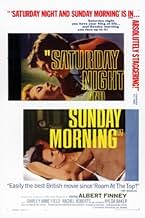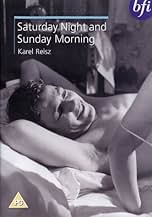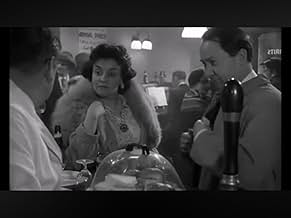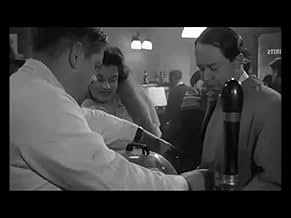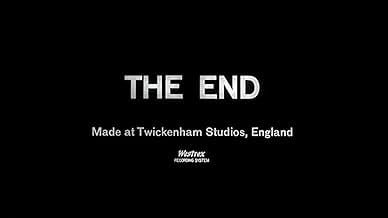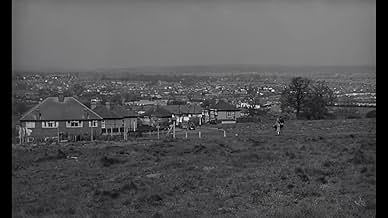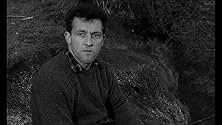Samedi soir, dimanche matin
- 1960
- Tous publics
- 1h 29min
Ajouter une intrigue dans votre langueA rebellious, hard-living factory worker juggles relationships with two women, one of whom is married to another man but pregnant with his child.A rebellious, hard-living factory worker juggles relationships with two women, one of whom is married to another man but pregnant with his child.A rebellious, hard-living factory worker juggles relationships with two women, one of whom is married to another man but pregnant with his child.
- Réalisation
- Scénario
- Casting principal
- Victoire aux 3 BAFTA Awards
- 10 victoires et 3 nominations au total
- Mrs. Seaton
- (as Elsie Wagstaffe)
- Loudmouth
- (as Colin Blakeley)
Avis à la une
This film was considered quite shocking at the time of its release because of its frank sexual situations and the freely-discussed topic of abortion. These themes aren't shocking anymore, but one reason for that is the introduction of them in films like this. Shot in black and white, it gives the viewer a picture of life in a bleak factory town, portrayed very realistically by director Karl Reisz. The actors are these people, they're not merely playing them. This is especially true of Finney, who sports a low-class accent and epitomizes the "angry young man" so prevalent in the late '50s. Finney's performance as a young man who takes out his work-week aggression on women, booze and mischief, is as revolutionary as Dean's or Brando's was in American cinema.
Finney is ably backed up by the supporting actors. Roberts is very effective as Brenda, a housewife married to a dull man, and Shirley Anne Field even dressed down is gorgeous as the ingénue who wins Arthur's heart and makes him look at the future. One wonders if he'll ever grow up sufficiently. She's going to have her hands full.
The dialect is very authentic and difficult to understand at times - I actually used my closed captioning. The dialect adds to the whole atmosphere of "Saturday Night and Sunday Morning," another of the rebel movies but in a class all by itself.
Today some will be puzzled by the dilemmas and themes to the point of "so what?"
Writer Alan Silitoe (from his own novel) quickly draws us in the to real world of a Nottingham factory worker. This is not the factory work of normal movies with the made-up hero having a blob of black stage paint across his forehead; more the dishevelled, sweaty, badly lit world that he knows from first hand experience.
In it we find Finney, smoking and gruff at his lathe. No actor, before him or after has ever made so much of an impression in a mundane situation as the ex-Shakespearen actor does here. Reality comes out of every pore. His matter-of-fact speaking voice, as a voice-over narrator, should not be underrated either - like someone giving testimony partly against their will.
His world of is one of petite rebellion and cheap thrills. The "fighting pit prop that wants a pint of beer." He is immoral and the wife of a friend is seen as fair game: Although the consequences are beyond his immature mind.
There is good supporting performances from British character actors such as Norman Rossington and Hylda Baker, but this movie belongs to one man and one man alone: Sir Albert Finney.
Twenty five years after he is dead the cinematic world is going to wake up and realize how brilliant an actor this man was: Like they did with Humphrey Bogart
The thing that deserves the most praise, however, is Sillitoe's script, which puts virtually all modern dramatic screenplays to shame. In a general way, the working class british films of the late 50s and 60s launched the tradition that leads to Loach, Leigh, Tim Roth, etc. This film's subtlety and ambivalence towards its leading character reminds me specifically of Mike Leigh at his very best.
"Neither of 'em's up to much, but it ain't our fault," he tells her. Like everything else in his unhappy life, it's all a matter of inheritance.
Arthur may share a name with a heroic English king, but he's not one to wear his lower-middle-class crown agreeably. He drinks away his wages, lashes out at defenseless women, and lies with discomfiting ease. But Albert Finney and the filmmakers make sure you care about him anyway.
As Seaton, Finney glowers a lot in the way you expect from a protagonist in a kitchen-sink drama, a celebrated product of British New Wave cinema. But the film plays with your expectations just as life does his. He doesn't want to settle for life as he finds it, and while "Saturday Night And Sunday Morning," Alan Sillitoe's adaptation of his own novel directed by Karel Reisz, spits a lot in the direction of conformity, it belies its angry-young-man pedigree with a sense of cosmic acceptance at taking what life has to offer.
Seaton's a "madhead," make no mistake. But he's not an especially honest one. He lies impulsively, often to no purpose, and is even proud of it. "I always was a liar, a good one and all," he tells the married woman he sleeps with, Brenda (Rachel Roberts). Ironically, it's his one honest moment on her behalf that lands him in real trouble.
The film gives us other hints Seaton is not an admirable figure, like shooting an annoying neighbor with an air rifle in a manner that comes off more creepy than defiant. A "working-class anti-hero," as other reviewers put it, and the real craft in both the direction and in Finney's performance is how it accomplishes the balancing act of establishing Seaton as both miserable company and a rooting interest.
It's a well-structured film, too, a quick 90 minutes that breaks neatly into thirty minutes of establishing the situation, thirty minutes of developing a crisis (Seaton stringing along two women, one pregnant), and thirty minutes of tense resolution. At the same time, Reisz gives his film a grimy authenticity that feels real, never stagy, with scenes that have a real lived-in quality while serving the larger story.
"Saturday Night And Sunday Morning" is a bleak film in many ways, not pleasant to watch. Laughs and insights are minimal, and Finney downplays his considerable screen charm. There are hardly any toothy grins like he'd bestow on his later breakout role, as the title character in "Tom Jones." The handling of his relationship with Doreen is a trifle pat, and too-simply resolved. So is the issue of his relationship with Brenda, although Finney shares a good final scene with her character's husband, played effectively by Stephen Fry lookalike Bryan Pringle.
There are a lot of good performances in this film, which blend together to create an effective if routine story. If it's not what you expect from angry-young-man cinema, it's nice to have your expectations batted down now and then.
In the theater, this revolt took the form of the "kitchen sink drama" and the era of the Angry Young Men In the movie industry, it was the era of "Free Cinema," an attempt by young filmmakers to break away from established subjects and standard treatments
This raw melodrama deals with Arthur Seaton (Finney), a working class young man who rejects the misery and grind of his home and factory, but whose only possible rebellion takes the form of a cynicism towards authority and a cheerful indulgence in sexual encounters with various ladies of the town His rebellion, though limited, is nevertheless genuine and the film's situation in a working class milieu is, for the habitually middle and upper class conscious British cinema, a much needed step forward...
Le saviez-vous
- AnecdotesThe factory scenes were filmed in the same factory that original author Alan Sillitoe worked in during the war when he was making shells and other artillery. At the time of filming, the factory was owned by the Raleigh bicycle company.
- GaffesWhen Arthur and Doreen meet for the first time, her packets of crisps on the counter disappear and reappear between shots.
- Citations
Arthur Seaton: Mam called me barmy when I told her I fell of a gasometer for a bet. But I'm not barmy, I'm a fighting pit prop that wants a pint of beer, that's me. But if any knowing bastard says that's me I'll tell them I'm a dynamite dealer waiting to blow the factory to kingdom come. I'm me and nobody else. Whatever people say I am, that's what I'm not because they don't know a bloody thing about me! God knows what I am.
- ConnexionsFeatured in Viewpoint: We the Violent: Part 1 (1961)
Meilleurs choix
- How long is Saturday Night and Sunday Morning?Alimenté par Alexa
Détails
- Date de sortie
- Pays d’origine
- Langue
- Aussi connu sous le nom de
- Todo comienza el sabado
- Lieux de tournage
- Société de production
- Voir plus de crédits d'entreprise sur IMDbPro
Box-office
- Budget
- 100 000 £GB (estimé)
- Montant brut mondial
- 370 $US
- Durée1 heure 29 minutes
- Couleur
- Rapport de forme
- 1.66 : 1
Contribuer à cette page



